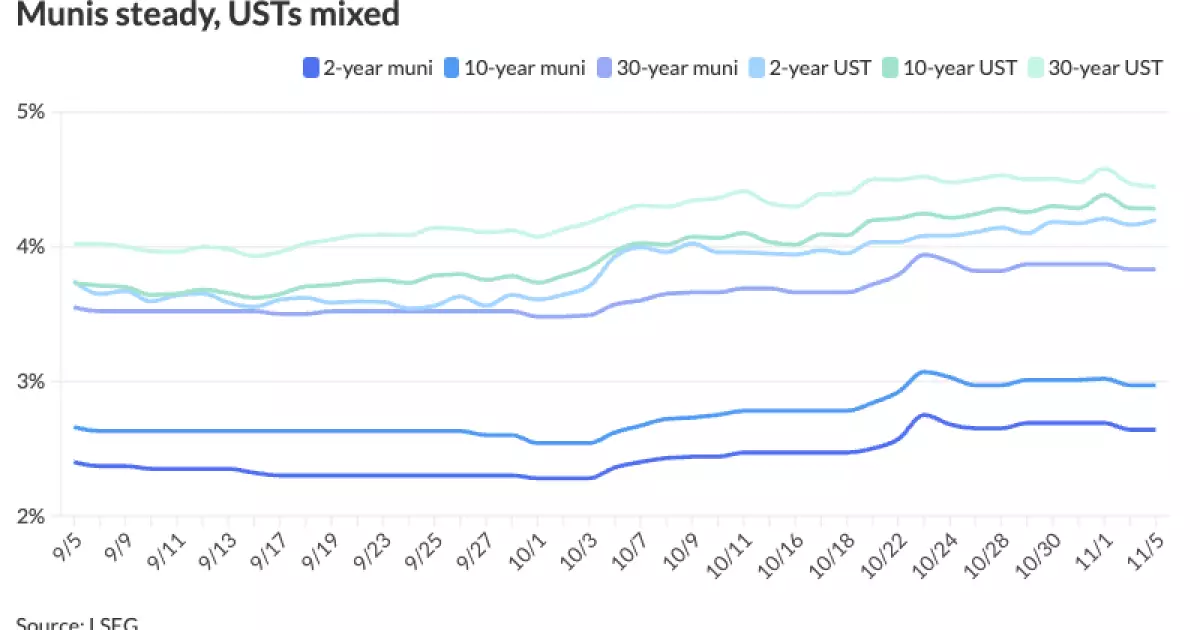As the nation braces for critical elections and decisions by the Federal Open Market Committee (FOMC), investors are observing a complex landscape where political outcomes and monetary policy intertwine. The looming elections, combined with the anticipated FOMC interest rate decision, are contributing to a climate of cautiousness among market participants. Municipal bonds are treading carefully as volatility is expected on the horizon, and the ramifications of the electoral outcomes will have lasting effects on both economic growth and monetary strategies.
The tension surrounding the upcoming elections is palpable. Analyst Erik Weisman from MFS Investment Management articulated the market sentiment: a Trump victory may signal an increase in inflationary pressures, whereas a Harris win may maintain a sense of economic stability. Historically, shifts in power often come with contrasting economic strategies that can alter market dynamics significantly. For instance, if Republicans secure dominance, particularly with a focus on reducing corporate taxes, the implications could spell challenges for tax-exempt municipal bonds. These factors lead to a precarious balancing act, where market corrections in response to the election’s outcome could be pronounced.
Recent analyses highlight a significant probability—around 48%—of Republicans achieving unified control, according to insights from Sage Advisory. In this context, the expectation of a divided Congress raises concerns about the feasibility of passing transformative policies. Meanwhile, a full Democratic sweep remains on the table, albeit with a lower likelihood of 12%. The consequences of such outcomes could be substantial, potentially leading to higher tax rates that could exacerbate existing financial strains on both individuals and businesses.
The Federal Reserve’s monetary policy has been a cornerstone of the fixed-income market’s behavior in recent years. However, this dynamic could shift dramatically depending on election results and proposed fiscal policies. Andrzej Skiba from RBC Global Asset Management notes that a Trump-led administration might introduce trade policies contributing to inflation, effectively stifling the Fed’s ability to reduce interest rates even during economic slowdowns.
This inflationary forecast is worth examining closely. Higher tariffs, particularly those aimed at significant trade partners like China, could lead to increased costs that, in turn, elevate inflation by a full percentage point. Such changes could force the Fed to reevaluate its stances on interest rates significantly, especially if the overarching economic conditions do not permit cuts.
Investor sentiment is acutely sensitive to potential political outcomes, presenting a complicated tapestry of expectations and realities. While some analysts, like Bryce Doty from Sit Investment Associates, argue that Trump’s policies could foster economic growth and subsequently raise tax revenues, the broader concern about national debt continues to loom large. Doty highlights that regardless of the political victor, the national debt’s upward trajectory poses challenges for both fiscal policy and interest rate management.
This economic landscape has created an investor atmosphere fraught with uncertainty. The Fed is navigating a precarious path, wrestling with contradictory needs to cut rates for stimulation while countering inflation concerns resulting from expansive government spending. Consequently, a middle ground may emerge, reflected in predicted modest rate cuts over the coming months.
As of now, the municipal bond market remains steady, with rates showing little change in the current environment. Refinitiv’s MMD scale indicates stable yields across various maturities, while Treasury yields present mixed signals with slight shifts. This current stasis serves as a temporary lull, with warming anticipations of more pronounced market movements post-election and after the FOMC’s critical announcement.
Looking ahead, the complexities of this upcoming electoral period will undoubtedly shape varying facets of the economy. Whether it’s through a sweeping Republican victory or a closely contested Democratic win, the relationship between politics, economic policies, and monetary decisions will warrant careful scrutiny. Investors, policymakers, and analysts alike must remain vigilant as the fate of municipal bonds, interest rates, and overall economic health hinges on the outcomes of these pivotal moments in American governance.
As the U.S. approaches these decisive events, understanding the intricate relationship between political decisions and economic ramifications will be key for aligning investment strategies and mitigating risks in an ever-changing financial landscape.


Leave a Reply